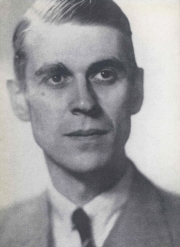Our War Leaders in Peacetime - Field Marshal Alexander
The War Illustrated, Volume 10, No. 231, Page 21, April 26, 1946.
Harold Rupert Leofric George Alexander – Field-Marshal Viscount Alexander of Tunis – as Governor-General is the King's representative in Canada, and as he has the simplicity and directness of manner appreciated by Canadians he is likely to be “accepted” everywhere there very readily. He sailed to the Dominion with his wife and family, to take up his appointment (in succession to the Earl of Athlone), on April 5, 1946.
“I've always wanted to live in Canada”, he said, “and no humbug about it. But I never thought I'd be Governor-General, and I hope they like me”. There is certainly no humbug (one of his favourite expressions) about Alexander. Though his name was among the best-known of all during the years of war as that of a brilliant military leader and planner, he is simple and retiring, and in leisure hours loved to look after the hens scratching among the leaves at Rideau Hall, his Georgian home on the edge of Windsor Forest. In the study there he spent hours reading about Canada, between helping to pack and answering batteries of questions from his children about their home-to-be.
Born in Ulster, in 1891, the third son of the Earl of Caledon, Alexander married in 1931 Lady Margaret Diana Bingham, daughter of the Earl of Lucan. Now he turns with half-derogatory remarks every reference to his success as a war leader; and although her eyes deny her words Lady Margaret backs him up by saying, “Alex is just an ordinary family man, you know”.
Local people grew accustomed to see the general who helped to defeat the Axis strolling around in an old pair of grey flannel trousers with his two sons and one daughter or romping with ten-year-old Shane and his younger boy, Brian. An athlete, Alexander has enjoyed many a week-end walking in Windsor Forest or shooting over the stubble, often by himself. Water-colour painting and botany are among his hobbies, and he is a member of White's and the Guards' Clubs.
At Rideau Hall he spent much time answering shoals of letters from men who served under him in North Africa and Italy. “The War Office has put a room at my disposal”, he said. “It's good of 'em, you know, for I'm not doing much for them these days and I couldn't run an office on my own – not on my salary, when I have to but such a lot of kit for Canada”.
With the children growing up, he gives the impression of being satisfied with the family life normal to most happily married people. He himself went to Harrow and Sandhurst, but his sons will not necessarily follow their father's example. The boys can go to Harrow, he says, but there's no reason why they should not be educated in Canada.
Previous and next article from Our War Leaders in Peacetime
Our War Leaders in Peacetime - Mountbatten
Born in Windsor, Berkshire, in 1900, “Dickie” Mountbatten – Rear-Admiral Lord Louis Mountbatten, Supreme Allied Commander South-East Asia – was brought up in the Naval tradition. Second cousin
Index
Previous article
His Majesty's Ships - H.M.S. Warspite
Motto: “I Despite the Hard Knocks of War.” There is scarcely a ship in the Royal Navy that is so well known to the public as the 30,600-ton battleship H.M.S. Warspite. Launched at Devonport in
Next article
His Majesty's Ships - H.M.S. Exeter
Motto: “Ever Faithful.” Launched at Devonport in 1929, H.M.S. Exeter of 8,390 tons, mounted six 8-in. guns as her main armament, and was thus the most powerful of the three British cruisers und




